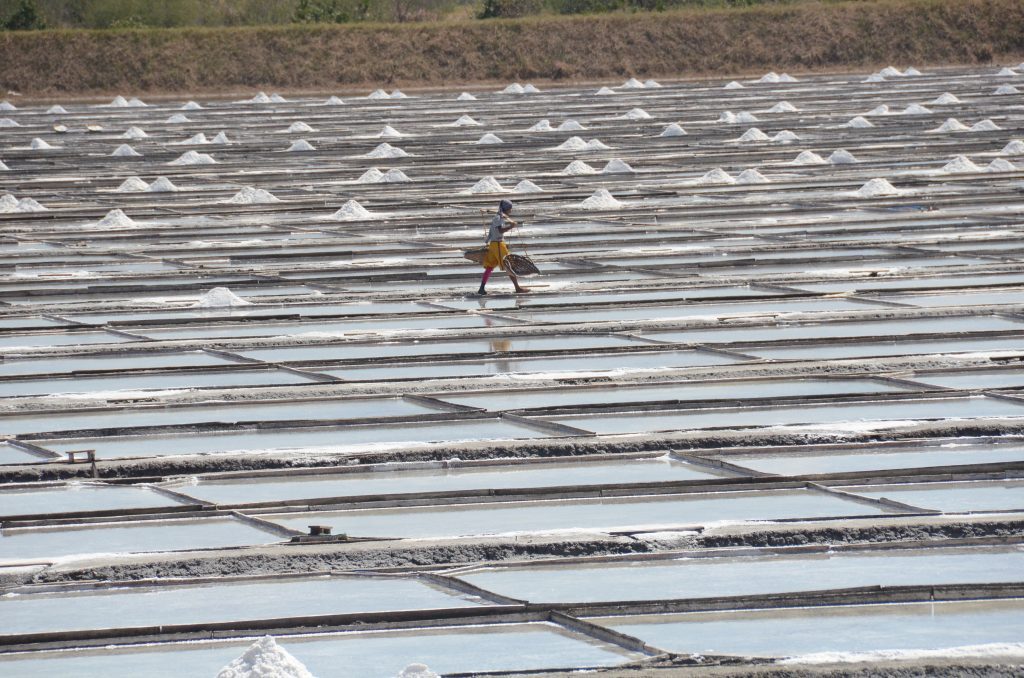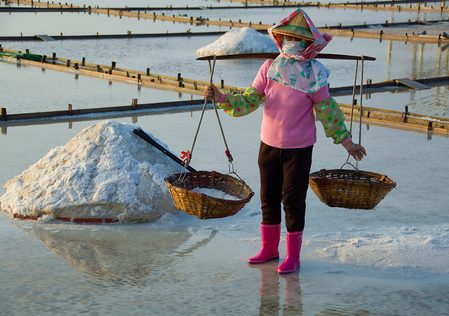SUMMARY
This is AI generated summarization, which may have errors. For context, always refer to the full article.

MANILA, Philippines – President Ferdinand Marcos Jr. has signed the measure essentially aimed at giving the Philippines’ salt industry a lifeline, Malacañang announced on Sunday, March 17.
Republic Act No. 11985, also known as the Philippine Salt Industry Development Act, mandates the designation of public lands as salt-production areas, in a bid to increase salt production in the country.
The law tasks the Department of Natural Resources (DENR) and attached agencies National Mapping and Resource Information Authority (NAMRIA) and the Bureau of Fisheries and Aquatic Resources (BFAR) to identify priority areas for salt production across over a dozen provinces, namely:
- Ilocos Norte
- Ilocos Sur
- La Union
- Pangasinan
- Zambales
- Bataan
- Occidental Mindoro
- Oriental Mindoro
- Palawan
- Marinduque
- Quezon Province
- Misamis Oriental
- Antique
Once the selected areas are mapped out, their administrative jurisdiction shall be transferred from DENR to BFAR, which shall then allocate the public lands to qualified salt farmers.
The Department of Agriculture shall provide technical and material assistance to salt farms.
Salt iodization optional in some cases
Not all locally produced salt shall be iodized, according to the new law signed by President Marcos.
Only food-grade salt shall be ionized, but salt produced by local farmers shall not be automatically categorized as food-grade.
“Iodization of artisanal and non-food grade salt and salt intended for export is hereby rendered optional in the country. The use of artisanal salt by food manufacturers and food establishments shall be allowed,” the law reads.
Lawmakers have blamed the Ramos administration-era Republic Act No. 8172, or Salt Iodization Law, for killing the industry, as salt producers found it challenging to keep up with the the sophisticated technology and machinery that salt iodization requires.
Other key provisions of the law include:
- the creation of a salt council, to be chaired by the agriculture secretary
- the formulation by the salt council of a salt roadmap
- the creation of a salt industry development task force in every local government unit, “as far as practicable”
- the mandatory use of domestically produced salt in government programs, including the fertilization of coconut farms by the Philippine Coconut Authority
- the classification of salt as an aquatic resource product exempt from all taxes
The Philippines has among the longest shorelines in the world, yet it imports up to 93% of its salt.
Urbanization through the years has taken a tall on the industry, as venues for salt farming have been converted into residential and commercial areas. – Rappler.com
Add a comment
How does this make you feel?

![[In This Economy] Marcos’ POGO ban is popular, but will it work?](https://www.rappler.com/tachyon/2024/07/thought-leaders-marcos-pogo-ban.jpg?resize=257%2C257&crop=255px%2C0px%2C720px%2C720px)
![[Rappler Investigates] POGOs no-go as Typhoon Carina exits](https://www.rappler.com/tachyon/2024/07/newsletter-graphics-carina-pogo.jpg?resize=257%2C257&crop=424px%2C0px%2C1080px%2C1080px)





![[Just Saying] SONA 2024: Some disturbing points](https://www.rappler.com/tachyon/2024/07/TL-marcos-sona-points-july-23-2024.jpg?resize=257%2C257&crop=335px%2C0px%2C720px%2C720px)

There are no comments yet. Add your comment to start the conversation.